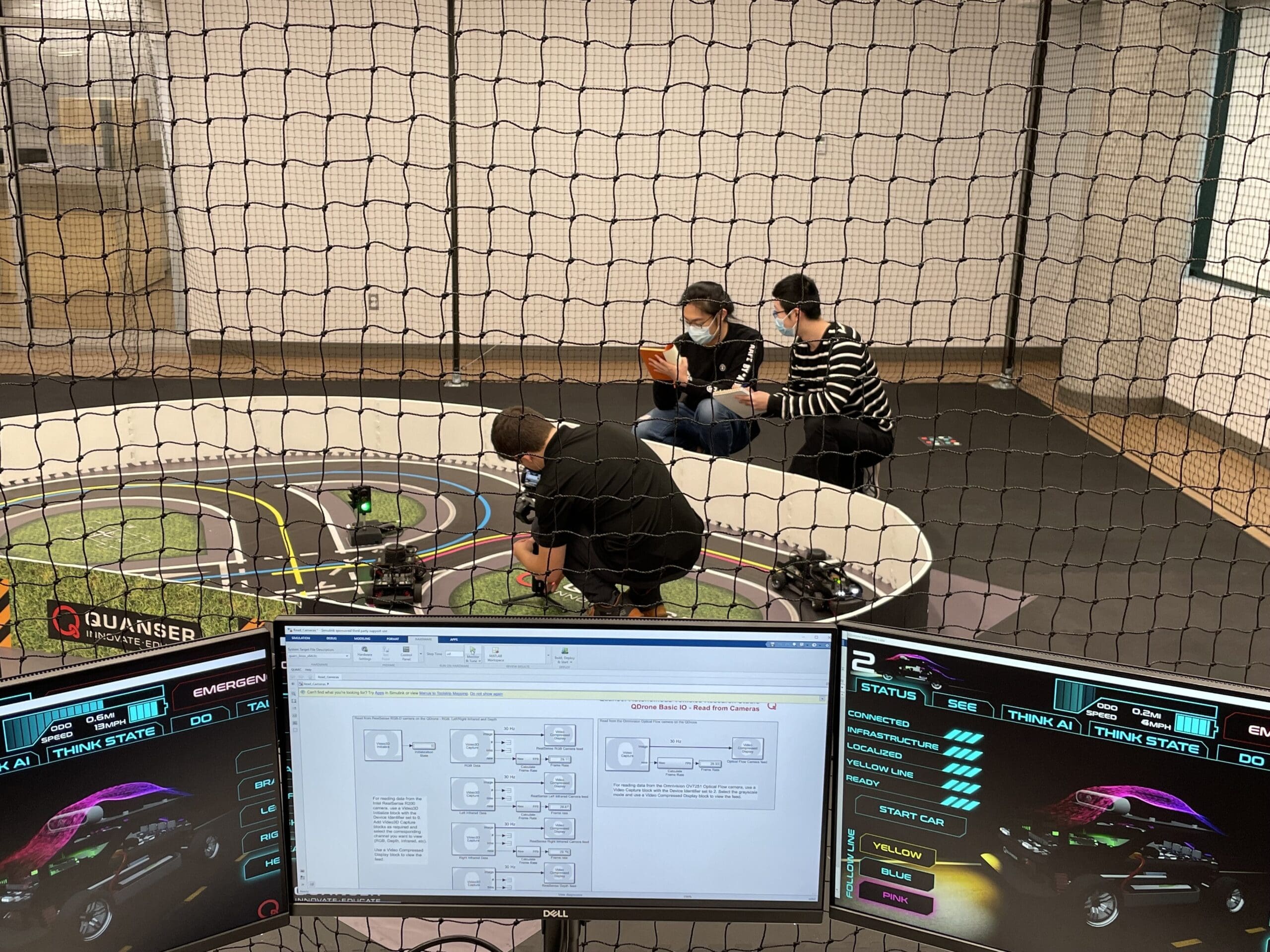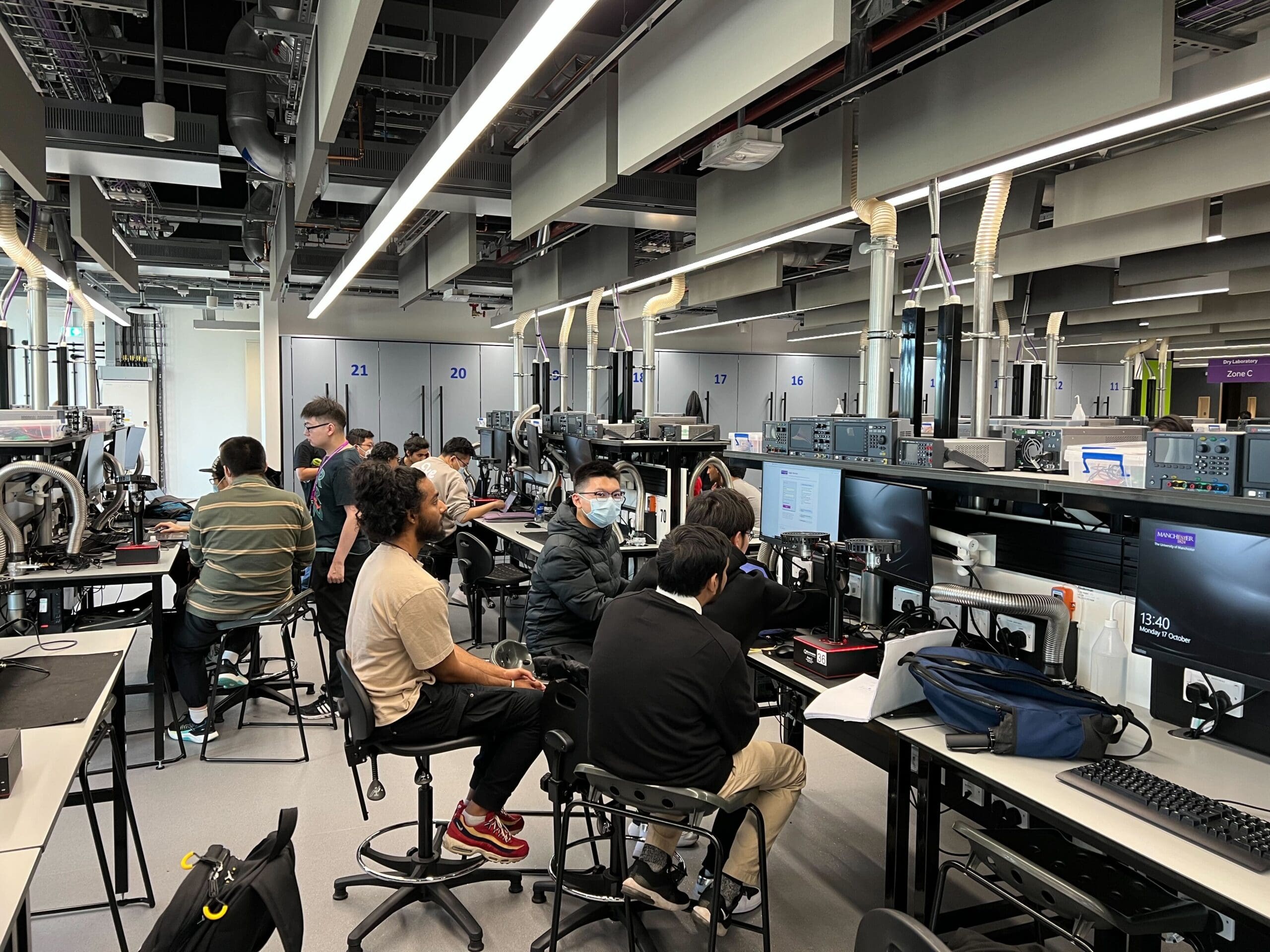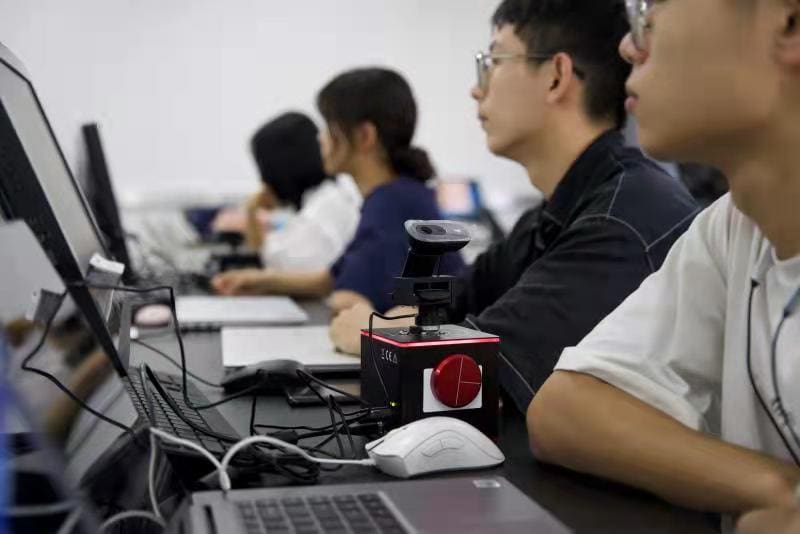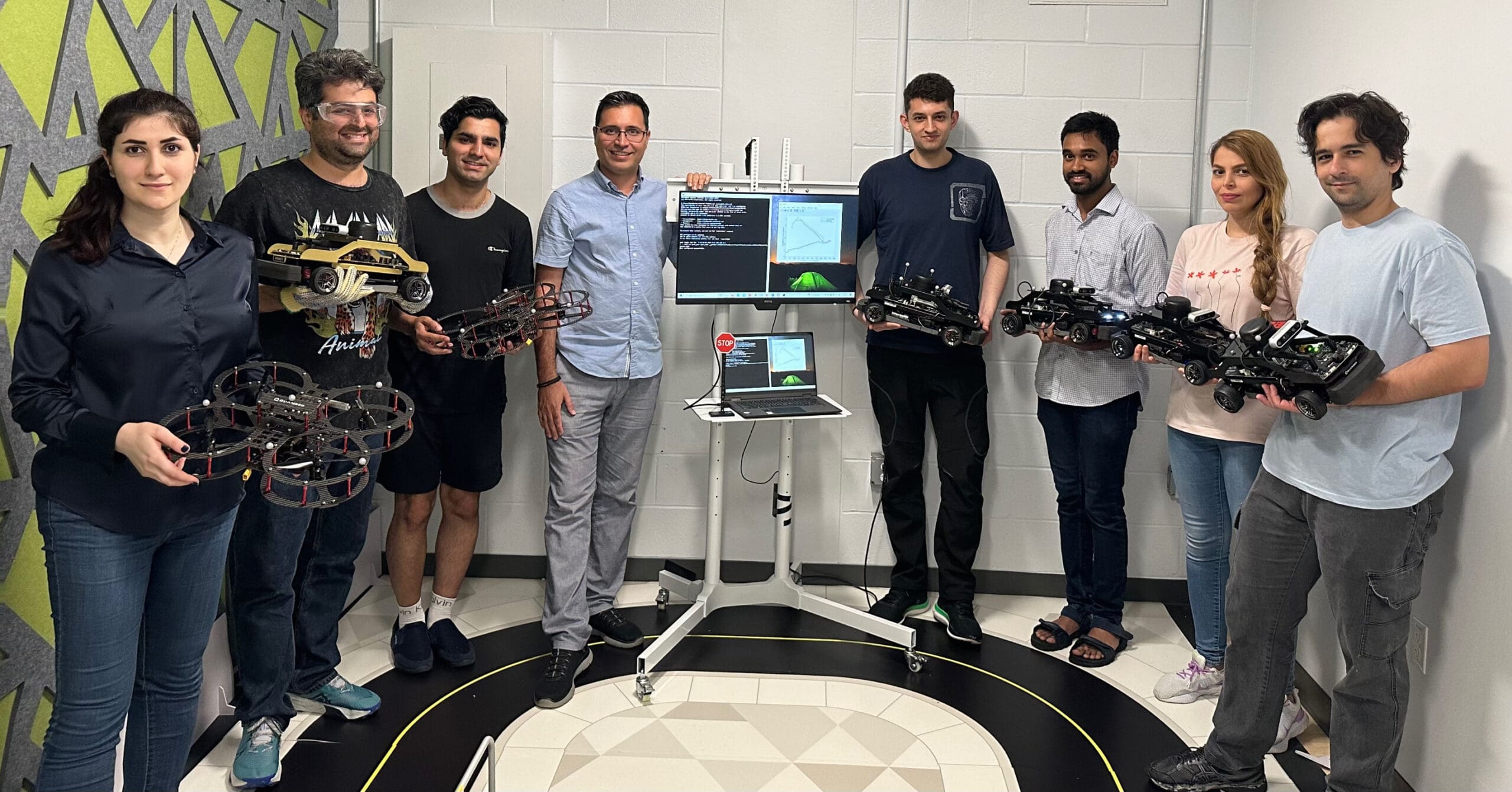
For years, Quanser has provided unparalleled support to the academic research community. As a customer-centric technology company, we redefine and develop solutions to offer academia a seamless and innovative lab experience. Our turnkey, ready-to-use labs are designed for teaching, research, project-based learning, competitions, and community outreach. Our solutions have evolved by incorporating customer feedback and continually improving.
A prime example of our customer-centric approach is our studio solutions including the Self-Driving Car Studio (SDCS) and Autonomous Vehicles Research Studio (AVRS), developed with over 25 years of experience in autonomous systems. These solutions accelerate the journey from innovative ideas to validated research. They save time in research labs, enhance student engagement, and foster a global community, enabling faster publication and sustained research growth. To learn more about the philosophy behind Quanser’s Studios, explore the insightful blog post by Peter Martin, Director of R&D at Quanser: ACCELERATE. VALIDATE. GRADUATE. 
Also, at Quanser, we know that due to the unique nature of academic challenges, it is crucial to accompany them along the journey and go above the typical customer relationship to a partner and colleague relationship. You can see how this approach has been manifested in the words of Dr. Siami. Our customer-centric approach has become a deep-rooted culture, with all our solutions benefiting from this mindset. We actively listen to the voices of academia, constantly seeking opportunities to learn and improve. One such opportunity arose when I attended a webinar by Dr. Milad Siami, part of the YOUser Webinar series curated by Quanser, titled ‘Optimizing Sparse Interactions for Control and Sensing in Complex Networks.’ Dr. Siami, a prominent professor at Northeastern University and a former postdoctoral associate at MIT’s Institute for Data, Systems, and Society (IDSS), specializes in cyber-physical network analysis, design, and control. His highly successful research team thrives in Boston’s competitive academic landscape, alongside Harvard and MIT, attracting many smart and high-quality students each year. Their research employs advanced theoretical methods, including control theory, optimization, graph theory, game theory, machine learning, reinforcement learning, and applied probability. It is supported by grants from the National Science Foundation, the Department of Homeland Security, the Office of Naval Research, and the Army Research Lab.
I was thrilled to speak with Dr. Siami during his visit to Quanser headquarters in Toronto. Hearing firsthand how Quanser products have impacted his research and teaching, and receiving his feedback on using SDCS and AVRS, was an amazing experience.
Challenge
Rapid Setup, Instrumented, and Open Architecture Lab
When Dr. Siami started at Northeastern University, he had to set up his lab quickly to start his research on autonomous systems. “As a young professor, having lab equipment ready to go was crucial to start our research right away.” He also needed tools that could make complicated theories simple and show how they work in real life. “To get grants, we need to show real results in advanced technology.” These tools had to make it easy to get funding for his new ideas.
Northeastern University stands out for its hands-on approach to learning, setting rigorous standards to equip students for the workforce. “We are among the top three in co-op placements because we hold high standards in practical and hands-on learning to prepare students for the job market.” This focus on experiential learning is key to enhancing student industry relevance and ensuring the university’s competitive edge. Additionally, Dr. Siami’s research demanded platforms capable of supporting the development and testing of adaptive algorithms in dynamic systems. “Our work on adaptive algorithms requires tools that can handle real-time data and evolving scenarios efficiently.”
Moreover, Dr. Siami had additional requirements. He needed access to industry-standard tools for practical skills in programming, computer vision, and AI. Scalable and flexible solutions were essential to accommodate a range of projects, from small-scale experiments to large-scale simulations. Reliable, ongoing support and continuous innovation were necessary to keep lab capabilities up-to-date. Furthermore, the hardware needed to allow low-level access to actuators while being durable and student-proof for multiple years.
You can find the challenges summarized in the image below.
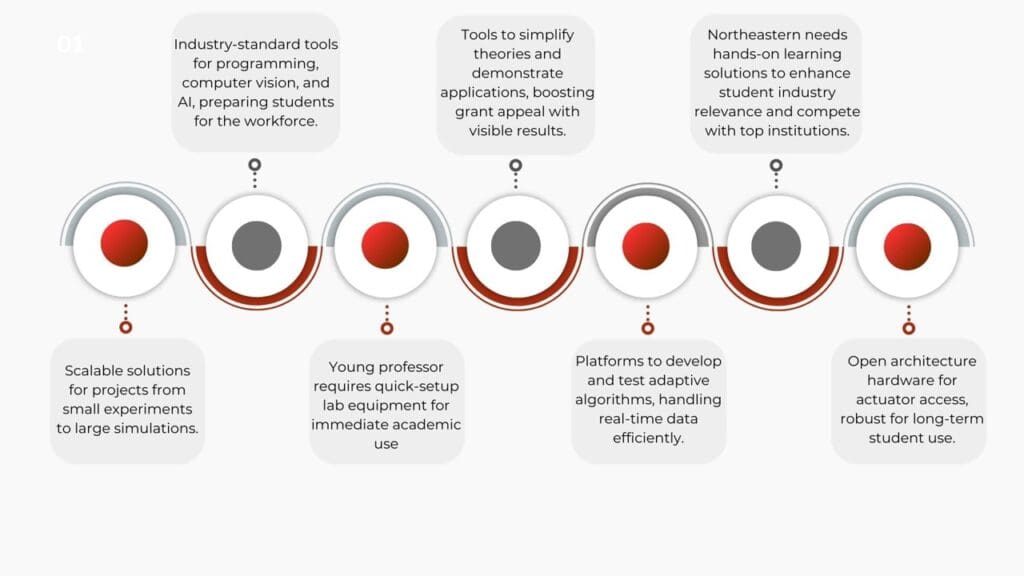
Listening to their needs and requirements highlights the complexity of finding academic solutions for researchers and educators. You might think a team of experienced engineers would need to build a new product to meet their needs, which is extremely costly and time-consuming. However, they found solutions that met all their requirements seamlessly. Let’s explore the solutions they used, which might surprise you as well.
Solution
Sensor-Rich, GPU-Powered AVRS and SDCS Labs with Digital Twin for Scalability
In early 2023, Quanser provided a suite of solutions to meet the needs of Dr. Siami’s lab, introducing the Self-Driving Car Studio (SDCS) and Autonomous Vehicles Research Studio (AVRS). These software-agnostic platforms, accessible through Python, ROS, MATLAB Simulink, and other industry-standard APIs, featured an array of sensors, including odometric, inertial, and visual sensors, and advanced NVIDIA GPUs, providing the necessary computational power for both research and teaching in advanced applications for autonomous systems and applied AI. “Students gained experience in computer vision and AI, popular in the industry, alongside ROS and Python.”
Adding a layer of high-fidelity virtual experimentation, the QLabs Virtual QCar enabled extensive testing and algorithm development in a controlled, simulated environment. “This platform could simulate 100 high-fidelity digital twins with all the features and characteristics of the physical product, including camera feeds and sensors, free from the constraints of the physical world.”
On-demand training and consultations from Quanser were crucial in maximizing the technology’s potential. “Having immediate access to expert training and support was indispensable in getting our lab operational quickly and efficiently. Quanser’s hardware features open architecture, allowing low-level access to actuators and flexible I/O while remaining robust and long-lasting. The durability and flexibility of Quanser’s hardware mean that our equipment remains functional and relevant, even with heavy student use,” Dr. Siami added.
At Quanser, we believe in bridging theory and practice. Join us to witness the practical application of AVRS and SDCS systems.
Dr. Siami’s research team has extensively explored managing large-scale, dynamic networks—such as smart power grids, autonomous vehicle fleets, and advanced robotic systems. These linear time-varying (LTV) systems require careful selection of sensors and actuators, as the relevance of each sensor’s input changes over time. An adaptive scheduling strategy is essential to adjust to current needs. For example, self-driving cars receive data from vision sensors, cameras, lidar, and IMUs, but not all data is necessary for identifying car positions or controlling the vehicle.

In one study, the research team focused on balancing agility and communication in large-scale second-order consensus networks (SOCNs) and autonomous vehicle platoons. To validate their theoretical framework, they utilized Quanser’s QCars and QLabs Virtual QCar. These QCars, specifically designed for comprehensive self-driving research, come equipped with various sensors, including LIDAR, 360-degree cameras, and an IMU, as well as an NVIDIA GPU. In their experiment, the QCars were remotely controlled to simulate real-world conditions, incorporating nonlinear dynamics and communication noise, in order to test proposed control laws. The accuracy of the vehicles’ movements was ensured through the use of Opti-Track motion capture cameras (a component of AVRS). Additionally, the Qlabs platform provided a virtual environment for preliminary simulations, allowing researchers to introduce many agents into the experiment and assess the efficacy of their control strategies before implementing them on physical QCars. This robust validation framework enabled researchers to test and validate the real-time decision-making capabilities of their algorithms, combining real-world testing with the Quanser Virtual QCar’s simulation environment.
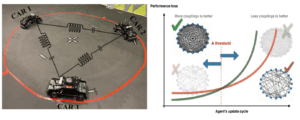
Their research shows that in a network of AI-enabled agents capable of sensing environments and communicating, having a dense network is not always optimal. Delays due to computation or network connections make selective communication more effective than all-agents communication, optimizing efficiency.
Result
Enhanced Research Productivity, Grant Success, Industry-Level Skills
Dr. Siami recalls the significant impact of adopting Quanser solutions at Northeastern University: “In the first year, we achieved a fully operational lab and facilitated the publication of research. Quanser’s support at the time of purchase and their training are extremely valuable. As we focus on theory, they provide a comfortable experience and handle all hardware aspects, opening many opportunities for us,” he said.
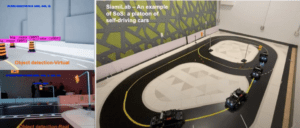
He highlighted how many PhD students in their first year often struggle to find their direction and may align with a project chosen by their supervisor, whether they like it or not. “Quanser products reduce this adjustment time by providing a highly versatile platform in autonomous systems (AVRS and SDCS), which is very inspiring for them to brainstorm and see their formulas applied in the real world.”
Furthermore, ten postgraduate students, primarily PhD candidates, are now actively engaged with the platforms. Dr. Siami emphasized, “Our students have access to courseware and projects, working with Python and ROS, tackling on-demand, industry-relevant topics like computer vision, which has significantly enhanced their hands-on learning and skill acquisition.”
In addition, with a large community of researchers using Quanser platforms like QCar and QDrone, they can easily review literature, see how other researchers set up and use “Quanser products, reducing setup time and validation, and finding inspiration in their publications for further research areas.”
Dr. Siami’s team is working in an advanced theoretical domain with extensive research in many fields. As a result, they can now delve deeper into their research, conduct more experiments, and have better research planning and roadmaps. “We’ve improved management of the research roadmap, strategically planning to implement theoretical publications more deeply into practical, real-world applications,” he explained.
Moreover, Dr. Siami pointed out the impact of Quanser solutions on grant proposal success. “By demonstrating the real-world applications of our research using up-to-date products equipped with cutting-edge technologies, we can visualize the application of our theory since we are in an advanced and theoretical domain. This has markedly boosted the likelihood of securing funding.”
It is worth mentioning that the Northeastern team’s first-place win in the 2023 ACC self-driving car competition underscored the practical, industry-relevant skills gained through the use of Quanser’s solutions.
The following figure illustrates the summarized results.

It was a delightful moment to hear, “We quickly proved our theory in experiments, and it’s inspiring to see its real-world applications.” To bring this moment to all researchers and educators, we at Quanser challenge ourselves to ensure our solutions are customer-centric. We continuously seek feedback from those who use our products daily to enhance their lab experience. We highly recommend checking out the SDCS and AVRS pages to explore these cutting-edge, customer-focused solutions in detail. We would love to learn more about your experience using Quanser products in your research lab. Please feel free to share your experience by sending me an email at Morteza.Mohammadi@Quanser.com.
